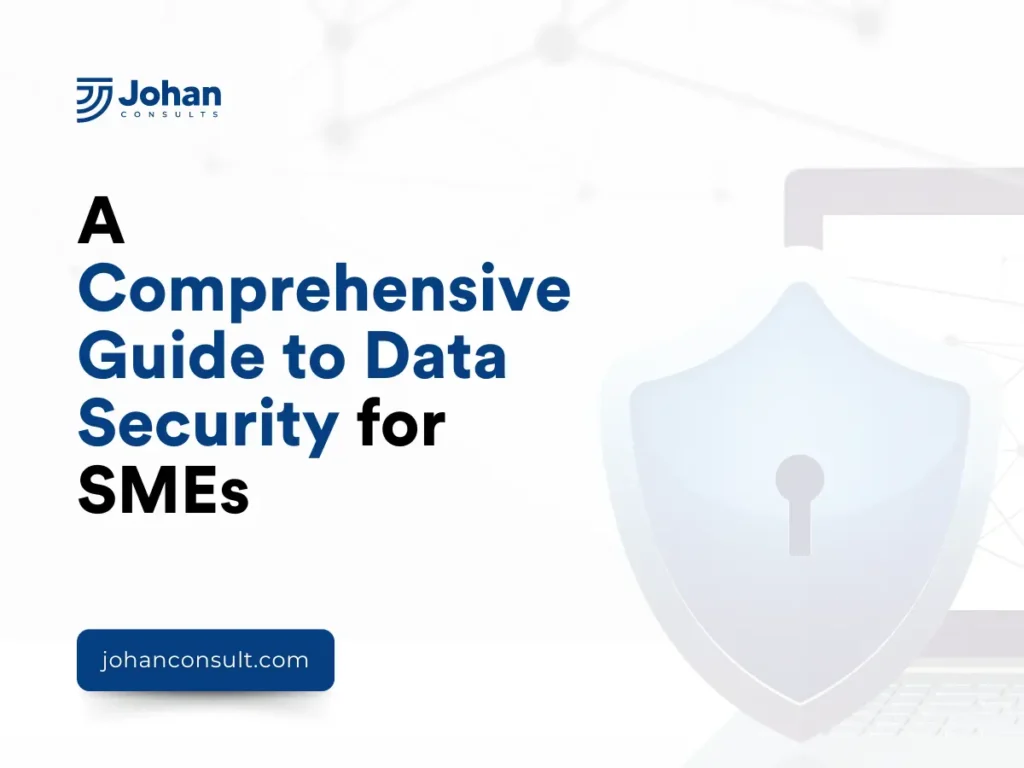The 7 Types of Cybersecurity You Must Know in 2024

What are the types of cybersecurity? Cybersecurity is so important that it can’t be overemphasized. According to Forbes, in 2023, there were 2365 cyberattacks with approximately 343,000,000 victims. How does that affect your organization? A large percentage of the cyber attacks reported were aimed at businesses—small, medium, and large. Actually, 71% of Nigerian businesses faced ransomware attacks in 2021. So, you need to take cybersecurity seriously for your organization’s sake. In this article, you’ll learn the different types of cybersecurity in 2024. What is Cybersecurity All About? Cybersecurity is the necessary process of shielding an organization in its entirety from cyberattacks. In recent times, there has been a rapid growth in the number of cyberattacks on organizations. To further complicate matters, businesses have a hard time fighting back. Some of the factors affecting the strength of the counterattacks are: Remote work: the era of brick-and-mortar work has long since passed and a new work mode has taken over. In fact, the majority of companies at one point or another employed the services of remote workers. An important enabler is the internet, which makes it easier for cyberattacks to take root. Sophisticated attacks: cyberattacks have evolved from what they used to be into a more complex and organized structure. They now operate with better technology, the likes of which most organizations aren’t prepared against. Complex environment: cybersecurity would’ve been more effective if only modern corporate networks worked on just one environment. Instead, it spans over multiple cloud environments and infrastructures. The results of cyberattacks can be devastating. Such breaches lead to loss of intellectual property and customer trust, in addition to the financial and reputational costs. That aside, there’s the matter of identity theft, fraud, and targeted attacks that follow data breaches. Bottomline is that every organization needs to up their cybersecurity game. What Are the Types of Cybersecurity? To effectively battle against cyber threats, you need to understand the different types of cybersecurity. There are basically 7 broad categories, which are: Network Security Of the types of cybersecurity, this is the first line of defense. Network security involves securing the channels of communication between computers in an organization. Since most attacks happen over the internet, it makes the most sense to secure that angle first. First, we have the basic methods of network security, which are encryption, implementing firewalls, and intrusion detection systems. Second, there are access control solutions like identity access management (IAM) and data loss prevention (DLP). Additionally, there are more advanced network security solutions, for example, NGAV (Next Generation Antivirus), sandboxing, and IPS (Intrusion Prevention System). Application Security Otherwise known as cloud security, this type of cybersecurity involves protecting the applications, devices, and infrastructure of an organization against attacks. To do that, a cloud security strategy must be implemented. Sure, cloud providers give security to an extent, but third-party security solutions will still be necessary to provide all-round application security. Mobile Security Data is stored on several devices, mobile devices included. Most times, mobile security is overlooked, which shouldn’t happen. With the constant increase in the use of mobile devices (tablets, smartphones, etc.) to access corporate data, it is important that this end is secured. Mobile security, among the types of cybersecurity, protects against cybercrimes and secures operating systems from jailbreaking and rooting. One solution is to use a mobile device management solution to grant access to authorized mobile devices only. End-user Education The types of cybersecurity list isn’t complete without the end users education. Organizations should raise proper awareness amongst their staff and other individuals about the importance of cybersecurity. Regular training programs will get the job done. Operational Security This is basically the implementation of policies and procedures to ensure proper security of systems and networks. Under this umbrella, regular assessments of existing cybersecurity systems and upgrading where necessary are covered. Also, regular employee training on best security practices in addition to establishing incident-response plans is included. Data Security As has been noted, data security is different from cybersecurity. Data security includes all methods used to protect the integrity, confidentiality, and accessibility of important information from external threats. Such methods include encryption, access controls, and backup systems to prevent unauthorized access, loss, and compromise. Note: Importance of Data Security Critical Infrastructure Security. This is straight to the point. It is everything you can do to protect the computer system in your organization. This includes all technologies, processes, etc. you use to ensure the systems continue to work properly. Data security vs. Cybersecurity Often times, cybersecurity is mistaken for data security. Although they are used interchangeably, they aren’t the same. Data security includes methods by which data (personal) is protected from loss, compromise, or threats, while cybersecurity guards all the digital networks and systems used to collect, transit, process, and store data. For example, if you run a healthcare facility for HIV/AIDS patients, for records-keeping, you’ll definitely collect and store a ton of sensitive information like patients names, medical status, home address, etc. Now, the methods you employ, e.g., encryption, tokenization, etc., to protect them from external threats are data security. Also, you’ll need to secure the computer and every other hardware used to input and store the data from unauthorized access, hence cybersecurity. In summary, data security is a type of cybersecurity. Conclusion In present times (2024), understanding the different types of cybersecurity is beyond important for proper data protection from ever-evolving threats. By implementing all-round security measures, from network and data security to end-user education, businesses can safeguard their systems, data, and reputation. At Johan Consults, we help you achieve maximum security for your data and assets. Contact us for a free initial consultation.
Top Data Security Certifications that Can Improve Your Career

The world is at a revolutionary point. Gone are the days when transactions always happened physically; now, every activity occurs online. Presently, you can meet new people, explore lands you haven’t visited, pay bills, and conduct business all on the internet. In the midst of all these, data is the crux. So professionals who know how to protect data in compliance with data protection laws are needed. In this article, the value of data security certifications is explained. Also, you learn about the top 7 certifications. Importance of Data Security With the spike in internet activities comes an increase in the generation and exchange of data. This value spells doom in the wrong hands. In the 1st quarter of 2024 alone, the number of data breach casualties in the U.S. totalled 28.5 million. That’s not all; companies large, medium, and small are constantly targeted by hackers. Why? Businesses use personal and sensitive information like name, credit card details, address, etc. for lots of reasons. So, organizations must secure data from loss, compromise, and unauthorized access to prevent reputational damage. Additionally, data security helps with compliance with data protection laws. How Earning a Data Security Certification Is Important According to the U.S. Bureau of Labor Statistics, the demand for data protection officers and information security may grow by 33% by 2030. This shows that more businesses will need the services of data security experts in the coming years. Earning a data security certification places you right in the spotlight. It gives you additional leverage in the workforce and angles you for better pay and exposure. With a certification, your confidence level increases and you work better. Additionally, you get to connect with professionals in related fields. Overall, you become a valuable asset in the workforce. Top 7 Data Security Certifications Here are some of the best certifications for data security you can get—in no particular order. Certification Information Privacy Management The International Association of Privacy Professionals offers this course. The CIPM is more relevant to people working in the following fields: It teaches the various strategies to implement data privacy laws and regulations in every part of a business. These are the skills you learn with the CIPM certification. Healthcare Information Security and Privacy Practitioner The International Information System Security Certification Consortium (ISC)2 as a program grants participants a healthcare information security and privacy practitioner certification. Patients’ information is extremely valuable so it’s important to secure it. This program teaches individuals ways to secure healthcare data. The following professionals will find this certification useful: CompTIA security+ This certification provided by CompTIA is accredited by the International Organization Standardization (ISO) and ANSI. This program teaches participants how to monitor and secure hybrid environments in compliance with regulations. In addition, it teaches how to analyze and respond to threats. This certification is especially useful to beginner professionals who want to hone their data security skills. While it’s an entry-level data security certification, certain requirements are advised for qualification. GDPR-certified Data Protection Officer One of the platforms offering this certification is the Professional Evaluation and Certification Board (PECB). It focuses on the General Data Protection Regulation (GDPR) compliance. This certification aims to teach participants how to advise and monitor GDPR compliance in organizations. Basically, you learn how to steer organizations towards maximum compliance with the GDPR. Certified in Data Protection For those interested in learning about best data protection practices for organizations, the Identity Management Institute (IMI) offers the certified in data protection certification. This certification addresses risk analysis and other important concepts in data security. It’s highly recommended for professionals who want to learn how to meet international security and privacy laws. Certified Ethical Hacker This is provided by the EC-council . This data security certification teaches hacking principles to identify weaknesses in the system and combat cyberthreats. The exam tests skills such as cryptography, cloud computing skills, and hacking strategies for various applications, platforms, and devices. To be eligible for the CEH certificate, professionals need to complete an official EC-Council training course—for those with no prior experience and 2 years of information security experience. Certified Information Privacy Technologist The IAPP offers this certificate to professionals aiming for data protection proficiency. This program focuses on the technological aspects of data protection in particular. While it’s open to anyone, informational technology and information security professionals will find it useful the most. This program teaches the following: Conclusion Credible data security certifications are not limited to the mentioned ones above. As an enthusiastic learner, you can explore the internet for a wide variety of courses. Also, register for courses that offer the best in terms of value and convenience. Pro tip: Never take on more courses than you can handle.
The Importance of Data Security in 2024

Introduction An organization comprises several sectors or departments. And the synchronization of all their activities makes the organization functional. How does the importance of data security come into play?. Data is an important part of every business and organization. It‘s use is versatile and broad. Organizations make use of data to know the pain points of their target audience, scope out the competition and do marketing. This article reveals the basics of data security and highlights its importance. Read on. What is Data Security? Data security is the process an organization takes to keep data safe from compromise, cyber attacks, mishandling, and other woes. All businesses, whether large, medium, or small, are at constant risk of data breaches—emphasis on ‘constant’. While SMEs think they aren’t on the target list, that couldn’t be more false. Small and medium businesses have proven to be easier targets of cyberattacks because they don’t have a comprehensive data security system. As a matter of fact, statistics show that SMEs will make up a large percentage of the total victims of attacks in 2024. Large corporations are not left out either, but they usually have better ways of securing data. Regardless, the financial implications of a successful data breach frustrate the big guns. The importance of data security goes beyond the one stated above. It is a legal requirement under several data protection laws, like the GDPR, NDPR, and the Data Protection Act of 2023. These laws mandate organizations to secure the personal data of employees and clients against unauthorized access, loss, and compromise. Failure to comply with the data security requirements of these laws incurs severe penalties. Differences Between Data Security and Cyber Security While the application of these terms overlaps, they cannot always mean the same thing. Data security is simply concerned with safeguarding data; on the other hand, cyber security protects the entire digital assets and computer system of an organization. For better comprehension, cybersecurity is the fence protecting the building (digital assets and computer systems) and data security is the door protecting a room (databases) in the building. Types of Data Security There are several ways you can safeguard data as an organization. You can use any combination of these methods you find suitable for your business. Below are some of the most common types of data security. Data encryption Data encryption is the logical scrambling of a dataset to prevent unauthorized parties from understanding it. This is perfect because hackers and other vile people cannot read it without a decryption key. Data erasure Data erasure is exactly as the name implies. After processing data for the intended use(s), you’ll need to get rid of them in accordance with the GDPR and NDPA. This method gets the job done without leaving a trace. Data backup Data backup involves storing another copy of the information on a secure external database. Do not mix it up with data storage. When you lose the original copy, you can easily retrieve the secondary copy as a replacement. This ensures data resiliency (continuity of data after loss or compromise). Data masking Although similar to data encryption, this method is a bit different. Rather than scrambling the data, some characters in the data are replaced with entirely different characters. This makes the information unreadable without the password. Authentication This is probably the most important type of data security. Here’s how it works. To access a particular data or database, authorized users must prove that their identity is accurate. This can be done with a login and password system. Biometrics like fingerprints and rectinal scans are further steps to authentication—two-factor authentication. Firewalls A firewall secures data by blocking access from certain IP addresses. importance of Data Security The importance of data security cannot be overemphasized. These are some reasons why you should take data security seriously in your organization. Unnecessary expenditure Businesses are always on the receiving ends of data insecurity. The reason why is that corporations have to spend significant amounts of money to reverse the damages inflicted during data loss, compromise, and theft. Aside from that, the owners of compromised data can seek to file lawsuits against the institution careless enough to lose data. Such actions take a toll on the company’s pocket. Automated attacks The importance of data security shows itself here. Hackers found an easier way to attack in the form of BOT attacks. It’s an automated system with which they can consistently raid your database without breaking a sweat. To combat this, all businesses need to update their data security systems. Reputational damage Absolutely no one would trust a brand known to always lose their data. Most data held by organizations is very personal and sensitive. Examples are names, bank details, health status, social media passwords, etc. The illegal release of such data is dangerous to its owners, as impersonations, targeted attacks, and online scams will be issued against them. Therefore, organizations need to secure data to protect brand image. Data integrity The integrity of data relies on its reliability and accuracy. This means that for data to maintain its integrity, it must be void of compromises or variations as much as possible. You can maintain data integrity through the centralization of data storage and putting it on various servers. This ensures that uncompromised data is available at all times. GDPR Compliance The General Data Protection Regulation is the law that guides organizations towards data protection in the EU. Although an EU law, the GDPR is regarded as the most comprehensive data protection regulation in the world. organizations In compliance with the GDPR, businesses and organizations have to implement foolproof data security systems. Why? The law penalizes defaulting entities with fines, sanctions, and even outright bans. Conclusion In 2024, data security will be a must for all organizations—small, medium, and large. With it, you can prevent financial loss and reputational damage in addition to complying with legal regulations like GDPR. endeavor to mount more data security methods in your organization; you’ll be better for it. Want more info on
A Comprehensive Guide to Data Security for SMEs

As the new goldmine, from the moment data is collected, stored, and processed, it is susceptible to cyberattacks. While large businesses might be too large a target for cybercriminals, the same can’t be said for small and medium-scale businesses. This is why knowing about data security is important for all businesses. In 2022, the Cyber Security Expert Association of Nigeria reported that cyberattacks on SMEs grew by 87%. The result of these statistics is evident: impersonations, identity thefts, financial thefts, and targeted attacks. This calls for more actions regarding data security amongst SMEs. What is Data Security? Data security is the process of safeguarding digital data from external threats (corruption, theft, and unauthorized access) to its integrity. It is important at every stage of data’s lifecycle—collection, processing, and storage. Often used interchangeably with data protection, it is not the same. Data protection is the entire process of safeguarding data from accidental loss or compromise. Basically, data protection focuses on safeguarding data from inside threats—mishandling and accidental loss. While data security keeps the bad guys out—unauthorized access and cyber attacks. Why is Data Security Important To SMEs? There are a handful of reasons why data security is important to SMEs. Top on the list are the legal implications of a successful data breach. Organizations are held accountable for data collected and processed under data protection laws. Under each one of those laws, businesses have to fulfil certain obligations towards data security. In the event of a data breach, the organization faces the full wrath of the law. Data subjects may also sue the business. There are also reputational consequences to consider. Data breaches cause so much damage to the reputation of the affected business. That’s something no business wants. Under the NDPR and GDPR, businesses are mandated to announce every data breach occurrence within a set timeframe. A weak data security system will cause any business to make such announcements regularly. It’s the business equivalent of the “walk of shame.”. And, of course, the financial costs of a data breach. Money and time will be spent to correct the effects of the attack. Since the entire data security system will be evaluated and updated. Most small and medium businesses cannot afford the costs of a data breach. So, adequate data security should be implemented. The 3 Pillars of Data Security There are three major elements, or principles, of data security, also called the CIA Triad. They serve as a template or framework for an absolute data security system. Here’s what they mean: Confidentiality: Data is accessed only by authorized users. Integrity: All data stored must be accurate, reliable, and not changed unwarranted. Availability: Data must be available and readily accessible when needed. Data Security Technologies for SMEs The right set of data security technologies is beneficial to Preventing data breaches in small businesses Data Auditing Data-auditing software solutions are just like spycams. They record everything from who accessed what information to control changes. Such software solutions are necessary for all small and medium-scale businesses to have. In the event of a data breach, it is easier to figure out the problem(s) with data auditing. Data Risk Assessment A data-risk assessment always carries out a thorough job. With it, sensitive data is discovered, along with potential threats to it. A data risk assessment goes the extra mile in preventing data breaches in small businesses by recommending remediation pathways. Data Real-Time Alerts Discovering a database takes far too long for organizations. Oftentimes, these reaches are discovered by customers and other third parties With real-time monitoring systems preventing data breaches in small businesses becomes easy, as SMEs get data breach alerts immediately. This helps to reduce data loss, destruction, and unauthorized access. Data Minimization The more data you have, the riskier it becomes. That is why data minimization is a data security technology. Always hold on to necessary data only. Data Security Regulations and Compliance Data security is such an important phenomenon that regulations for it have sprung up all over the world. What is the need for data security regulations? It is necessary to provide a clear data protection or security template to organizations. Also, to protect the rights of data subjects, such laws have to be laid down. That way, any organization defaulting can be held accountable. Important Data Security Regulations As a growing business willing to go the extra mile to secure data, it’s of utmost importance that you understand regulations. Here is a small compilation of data security regulations you need to know. The most popular regulation is the GDPR (General Data Protection Regulation). It was enacted in the European Union to ensure proper data protection for its citizens. The main focus of the GDPR is personal identifiable information (PII). It requires every organization handling EU data, in or outside the region, to practice premium transparency. The GDPR is not to be trifled with. It imposes dire punishments on any organization found to be non-compliant. A fine of EUR 20 million or up to 4% of the annual global profit, whichever is higher, can be imposed on offending parties. NDPR (Nigerian Data Protection Regulation) This regulation is an adaptation of the GDPR. The major difference between the two is scope. Established in 2019, the NDPR aims at protecting personal data that belongs to Nigerian citizens from loss, compromise, and unauthorized access. Payment Card Industry Data Security Standards (PCI-DSS) This regulation applies to any business that handles credit card data. Be it acceptance as a payment method, storage, transmission, or even third-party service involvement,. Unlike the GDPR and NDPR, it is not imposed by a government body. PCI-DSS is enforced by an independent regulatory body called the Payment Card Industry Security Standards Council. Data Compliance vs. Data Security Compliance Oftentimes, data compliance is mistaken for data security compliance. The former concerns the entity rules and regulations applicable when handling data. While the latter, data security compliance, is a subset of data compliance,. It is restricted to the security aspect of handling data. In a nutshell, data security compliance is a type of data compliance.


